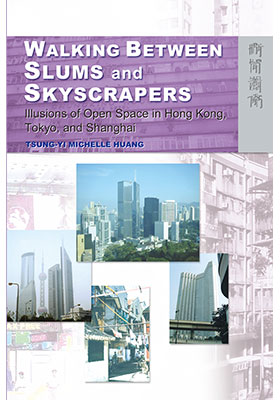Walking Between Slums and Skyscrapers
Illusions of Open Space in Hong Kong, Tokyo, and Shanghai
(游走於貧民窟與摩天大樓之間:香港、東京與上海開放空間的假象)
ISBN : 978-962-209-636-3
March 2004
184 pages, 6″ x 9″
Ebooks
The book is concerned with the effects of globalization on living space (i.e. the space of everyday life), focusing specifically on East Asian metropolises, such as Hong Kong, Tokyo, and Shanghai. Globalization has given rise to accessible catch-phrases such as the “global village” and “this is a small world.” In each part of the book the author juxtaposes a “social” account of the city’s urban space as it has been reshaped by the process of globalization with a “private” account of the urban landscape as experienced by its walkers (as represented in the films of Wong Kar-wai and Shinya Tsukamoto and the novels of Wang Anyi). Rather than rest here, the author wishes to show that for many of the inhabitants of the new global city, the “shrinking world” phenomenon is deeply literal: the “lived” space of everyday life is shrinking to make room for rezoning, construction of new infrastructures, space modification—all in the name of urban development.
“A revelatory journey–imagine Walter Benjamin in Hong Kong–through the modern Asian mega-city and the labyrinth of its representations. Huang is a brilliant essayist and guerrilla geographer who doesn’t hesitate to knock urban theory off its weary Eurocentric pedestal. The result is sensational.” —Mike Davis, author of City of Quartz and Ecology of Fear
“An intelligent and witty examination of the politics of space in the global city. The author brilliantly dissects how the expanding urban glamour zone relentlessly tightens the knot around the lived space of everyday life for a growing number of residents in Shanghai, Tokyo and Hong Kong.” —Saskia Sassen, author of Globalization and Its Discontents
“This book is a breakthrough study in English of the literary and cinematic representations of the Asian metropolis in the shadows of globalization. Drawing on literary, visual, and sociological sources, Michelle Huang elucidates the systematic straitjackets that constrain the body and the illusions that drug the mind. She shines a searching light on the gap between the glamorous mirage of infinite space of capital and the lived strata of the disadvantaged urban residents. This gap gives the lie to the promise of freedom by the myth of globalization. Huang reveals the individual’s unending struggle to wrestle with the rational, alienating imperative to restructure urban space and regulate the lived space and mobility of ordinary people.” —Ban Wang, author of The Sublime Figure of History: Aesthetics and Politics in 20th Century China

